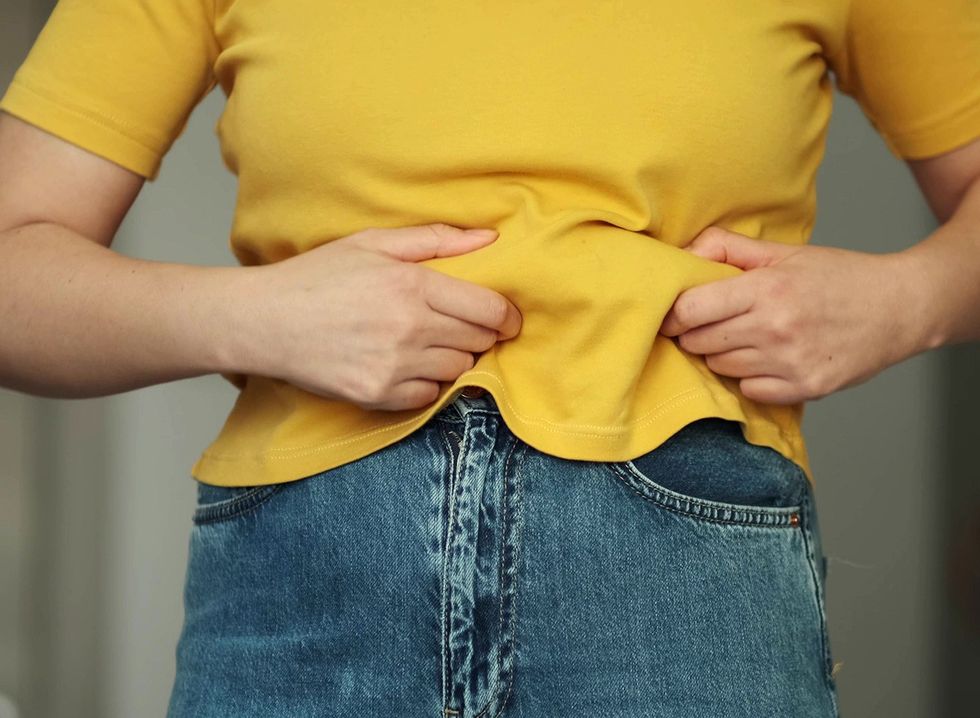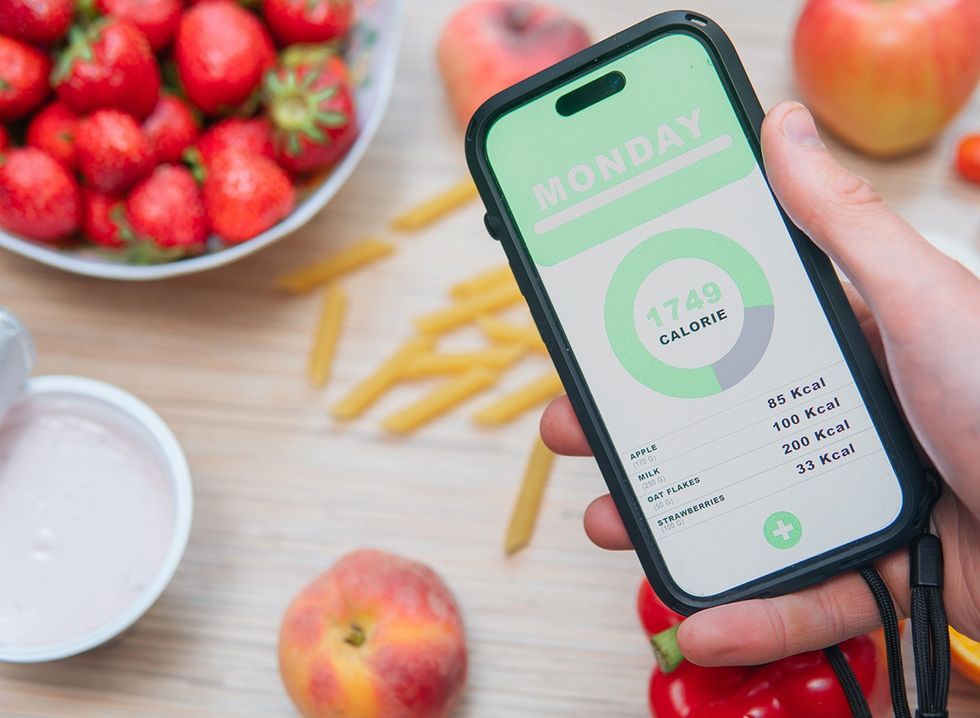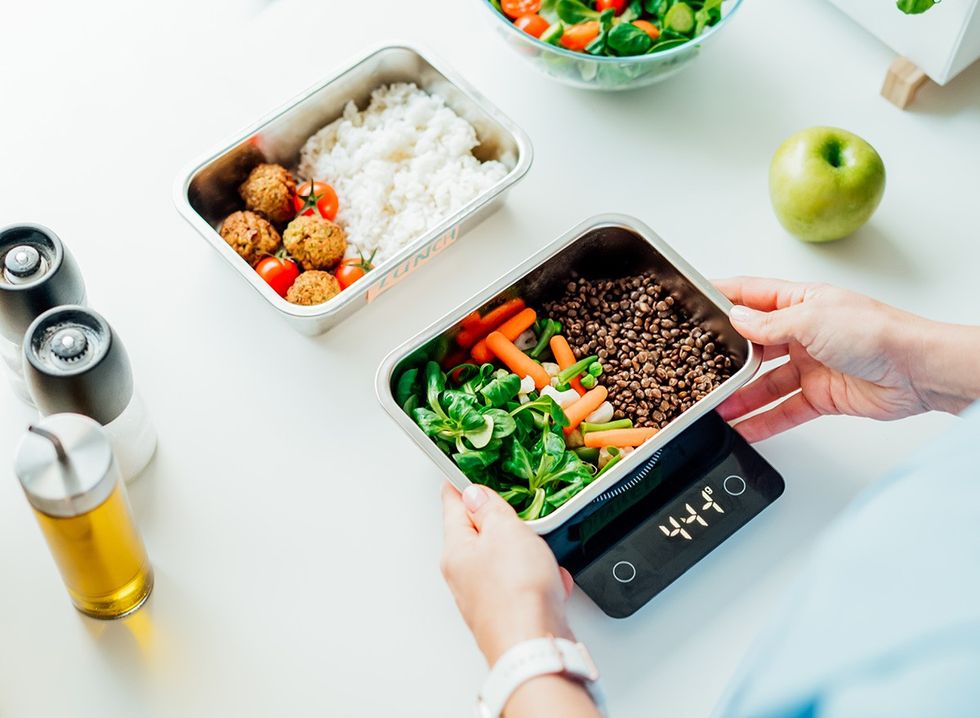Bloating happens to the best of us – especially women. Whether due to stress, hormone fluctuations, or gut/digestive issues, a bloated, gassy belly is never fun. Luckily, there are some things you can do to minimize the bloat, according to Kenneth Brown, MD, a Texas-based gastroenterologist, Founder and Chief Medical Officer of Atrantil, and the host of the Gut Check Project podcast. “During the menstrual cycle, hormonal fluctuations, primarily estrogen and progesterone, can have a significant impact on gastrointestinal function for women. These changes can lead to symptoms such as bloating, abdominal discomfort, and changes in bowel,” he says. “There are a few strategies that encompass dietary adjustments, lifestyle changes, and targeted supplements that can help with bloating during various phases of the cycle.”
Amp Up Your Fiber Intake

A fiber-rich diet can help with bloating, says Dr. Brown. “A balanced diet with ample fiber can regulate bowel movements and prevent constipation, a common cause of bloating,” he says. While you should include a variety of fiber sources like fruits, vegetables, whole grains, and legumes, “take care not to rapidly increase fiber intake, as it can temporarily worsen bloating,” he notes. “Gradually increase fiber consumption and make sure to drink plenty of water to support healthy digestion.”
Hydrate

He also recommends hydrating. “Maintaining proper digestive function and preventing constipation requires adequate hydration,” he continues. “Aim to drink at least 8 glasses of water per day, and more if you are physically active or reside in a hot climate. Sufficient hydration can also help reduce water retention, which can contribute to bloating.”
Exercise

Physical activity is also important. “Engaging in regular physical activity stimulates intestinal motility, reduces constipation, and eases bloating,” says Dr. Brown. “Moderate exercises like walking, cycling, or swimming for at least 30 minutes a day can be beneficial. Gentle yoga poses that target the abdominal region, such as cat-cow poses or seated twists, can also promote digestion and relieve bloating.”
Manage Your Stress

Stress has a significant impact on digestive function and can worsen bloating, Dr. Brown claims. “Adopt stress-reducing techniques such as deep breathing exercises, meditation, or mindfulness. Engaging in relaxing activities like reading, taking a warm bath, or listening to soothing music can also lower stress levels and promote overall digestive health,” he says.
Eat Mindfully

Also, practice mindful eating. “Eating habits play a role in bloating,” Dr. Brown notes. “Practice mindful eating by thoroughly chewing food, eating slowly, and avoiding distractions like television or smartphones. This can prevent overeating, improve digestion, and reduce the likelihood of bloating.”
Limit Trigger Foods

Certain foods can heighten bloating, especially during the menstrual cycle when the digestive system becomes more sensitive. “Common trigger foods include dairy products, artificial sweeteners, and high-fat or spicy foods,” Dr. Brown reveals. “Keeping a food diary can help identify personal trigger foods and limit their consumption, especially during the premenstrual and menstrual phases.”
Related: 15 Quick Ways to Lose Body Fat Percentage in a Week
Drink Herbal Teas

Certain herbal teas like peppermint, ginger, and fennel possess natural properties that ease bloating and promote digestion. “Enjoying a cup of these teas after meals may provide relief from bloating and abdominal discomfort,” suggests Dr. Brown.
Try Over-the-Counter Remedies

In some instances, over-the-counter remedies like Atrantil “can not only reduce bloating by absorbing gas, but also feed your good bacteria which prevents bloating in the long term,” he says.
Drink Warm Lemon Water

Warm lemon water may help alleviate bloating for some individuals “by promoting hydration, stimulating digestive enzymes, increasing bile flow, reducing inflammation, and supporting regular bowel movements,” says Dr. Brown. “However, its effectiveness can vary depending on the underlying cause of bloating and individual factors such as digestive health and diet. It's important to note that warm lemon water may not be suitable for everyone, especially those with GERD or acid-related digestive issues.”
RELATED: Whitney Simmons Poses in Sports Bra and Shares Her Barbell Squat Routine
Get Some Probiotics or Prebiotics

When examining the broad scope of data on probiotics, studies have generally found them to be no more effective than a placebo over the long term. “However, it's important to note that probiotics can still provide benefits for some individuals. If it works for you, continue taking them. However, people with SIBO should be cautious as probiotics may exacerbate bloating by introducing more bacteria into areas where they shouldn't be,” says Dr. Brown. Prebiotics, such as large complex polyphenols like Quebracho Colorado, and fibers like inulin, “play a vital role in managing bloating and supporting digestive health,” he adds. “They selectively stimulate the growth of beneficial bacteria in the gut, which helps rebalance the gut, reduce inflammation, improve gut movement, aid enzyme production, and positively influence the gut-brain connection. Recent studies have shown that Quebracho Colorado offers greater benefits than inulin, leading to increased short-chain fatty acid production and improved microbial diversity. Incorporating prebiotics into your diet can have a powerful impact on your digestive well-being and bloating management.”
💪🔥Body Booster: If you are experiencing bloating, focus on hydrating and eating healthier foods.














 Shutterstock
Shutterstock Shutterstock
Shutterstock Shutterstock
Shutterstock alexxandra.fitt/Instagram
alexxandra.fitt/Instagram

 Olive OilShutterstock
Olive OilShutterstock It's Now Part Of My LifeShutterstock
It's Now Part Of My LifeShutterstock Beans and Lentils: The Hunger-Fighting Fiber ChampionsShutterstock
Beans and Lentils: The Hunger-Fighting Fiber ChampionsShutterstock SalmonShutterstock
SalmonShutterstock 12 Surefire Ways to Lose Abdominal Fat, Say ExpertsShutterstock
12 Surefire Ways to Lose Abdominal Fat, Say ExpertsShutterstock Chronic StressShutterstock
Chronic StressShutterstock Shutterstock
Shutterstock Remember:Shutterstock
Remember:Shutterstock

 Shutterstock
Shutterstock Shutterstock
Shutterstock Shutterstock
Shutterstock Shutterstock
Shutterstock Shutterstock
Shutterstock Shutterstock
Shutterstock Shutterstock
Shutterstock Shutterstock
Shutterstock Shutterstock
Shutterstock

 Shutterstock
Shutterstock Shutterstock
Shutterstock Shutterstock
Shutterstock Shutterstock
Shutterstock Shutterstock
Shutterstock Shutterstock
Shutterstock Shutterstock
Shutterstock Shutterstock
Shutterstock Shutterstock
Shutterstock Shutterstock
Shutterstock Shutterstock
Shutterstock Shutterstock
Shutterstock

 I'm a Nutritionist and These 9 High-Protein Snacks Keep My Clients Full While Losing 50 Pounds
I'm a Nutritionist and These 9 High-Protein Snacks Keep My Clients Full While Losing 50 Pounds
 Shutterstock
Shutterstock 2. Processed FoodsShutterstock
2. Processed FoodsShutterstock Shutterstock
Shutterstock Shutterstock/Prostock-studio
Shutterstock/Prostock-studio Shutterstock
Shutterstock Pro TipsShutterstock
Pro TipsShutterstock Shutterstock
Shutterstock Shutterstock
Shutterstock Shutterstock
Shutterstock Shutterstock
Shutterstock Don’t Drink as Much AlcoholShutterstock
Don’t Drink as Much AlcoholShutterstock Most Women on GLP-1s Are Making a Few Common MistakesShutterstock
Most Women on GLP-1s Are Making a Few Common MistakesShutterstock Soda and Sugary DrinksShutterstock
Soda and Sugary DrinksShutterstock Shutterstock
Shutterstock Eat BreakfastShutterstock
Eat BreakfastShutterstock And Improve Insulin SensitivityShutterstock
And Improve Insulin SensitivityShutterstock Belly Flab Strip Tip: Sugar and Fat Calories Leave Its Mark on Your BodyShutterstock
Belly Flab Strip Tip: Sugar and Fat Calories Leave Its Mark on Your BodyShutterstock Shutterstock
Shutterstock The Drugs Mimic the GLP-1 Hormone Naturally Produced by the BodyShutterstock
The Drugs Mimic the GLP-1 Hormone Naturally Produced by the BodyShutterstock 3. Deep-Fried ItemsShutterstock
3. Deep-Fried ItemsShutterstock